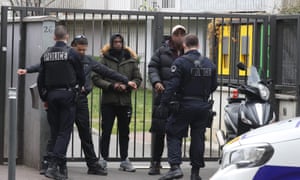
The “disinfecting” of Roma communities by low-flying planes and the high number of fines handed to minority groups has been cited in a report as evidence of the racial bias in the policing of the coronavirus lockdowns in Europe.
The report by Amnesty International, examining the enforcement of physical distancing measures in 12 European countries, concludes that the pandemic has led to greater “marginalisation, stigmatisation and violence”, echoing the long-standing concerns aired by the Black Lives Matter movement.
An increase in the stopping and searching of black people in London – from 7.2 out of 1,000 in March to 9.3 out of 1,000 in April – is referenced in the report, along with the lengthy curfews imposed specifically in areas in France where black, Asian and minority ethnic communities live.
In the département of Seine-Saint-Denis in Paris, home to a high proportion of black residents, the number of police checks was more than double the national average. The number of fines issued was also three times higher than in the rest of the country, despite respect of lockdown measures being comparable with other regions in France.
Amnesty said it had verified 15 videos of unlawful use of force or racist and homophobic insults by law enforcement officials from 18 March to 26 April 2020 in 15 French cities. Six of these involved enforcement of lockdown rules.
Some of the more shocking examples cited by the report, Policing the Pandemic: Human Rights Violations in the Enforcement of Covid-19 Measures in Europe, concern the mistreatment of Roma communities, often spurred on by populist politicians.
Between March and May 2020, Amnesty documented cases of militarised quarantines of 10 Roma settlements in Bulgaria and Slovakia.
In Burgas, Bulgaria, the authorities targeted the Roma community with drones fitted with thermal sensors to take the temperature of residents and monitor their movements.
In the town of Yambol, the authorities used planes to “disinfect” the Roma neighbourhood. Residents were advised not to leave their homes during the spraying of the area. The community was then kept under strict quarantine – even after the nationwide state of emergency ended on 13 May.
The Bulgarian National Movement (VMRO) party, a junior coalition partner in the country’s government, had described the Roma as a collective threat to the general population that needed to be “controlled and contained”.
The minister of the interior, Mladen Marinov, threatened further coercive measures “to protect the general population” if Roma people failed to comply with strict physical distancing measures.
In Slovakia, the government quarantined five Roma settlements in the east of the country on 9 April after finding 31 cases of Covid-19 among more than 6,800 residents.
All the areas were taken out of quarantine on 15 May, but those who tested positive and their relatives – about 100 people – continued to be held in housing containers after that date, Amnesty said.
The report also finds that asylum seekers, refugees and migrants in camps and shared accommodation were targeted with quarantines in Germany, Greece, Cyprus and Serbia.
Under the state of emergency in Serbia, the authorities imposed a regime that targeted government-operated centres housing asylum seekers, refugees and migrants. It placed them under a 24-hour mandatory quarantine and deployed the military to monitor the curfew.
Pierrette Herzberger-Fofana, a German MEP who made headlines after highlighting her experience of abuse at the hands of police officers in Brussels on the day the European parliament debated anti-racism protests, called for countries other than the UK to collect disaggregated data on the ethnicity of those subjected to law enforcement.
She said: “This research shows racialised groups, black people, Roma people, people of north African origin and migrants are much more likely to be targeted and victims of police violence.
“The brutal killing of George Floyd once again brought the reality of police brutality in the spotlight. We must take the momentum of this moment to push for concrete change.”
source https://www.theguardian.com/world/2020/jun/24/policing-of-european-covid-19-lockdowns-shows-racial-bias-report



0 تعليقات